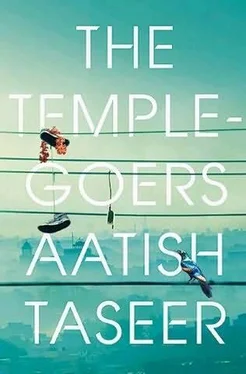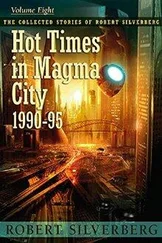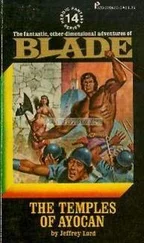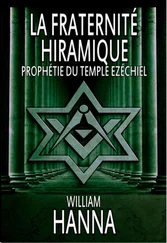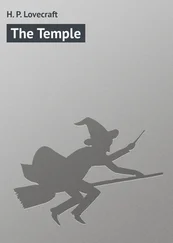‘Why?’
‘It’s for a jagran we’re organizing in my colony. I want you to come.’
‘A jagran?’
‘Tch, you really don’t know anything,’ Aakash said. Then looking at Uttam, he added, ‘Tell him what a jagran is. I don’t have the time right now.’
I took out eleven hundred rupees, including a red thousand-rupee note, and gave them to Aakash. He put them in his back pocket and vanished behind Junglee’s brushed-steel door.
On the way home, Uttam explained that a jagran was an all-night wake of sorts, with devotional singing, pageants and prayers.
‘It’s all rubbish,’ Uttam said bitterly, having seen Aakash extract a third of his monthly salary from me. ‘Just a way for the Brahmins to make money.’
When that evening she was disappeared, the news came as a matter of course. Aakash especially, expecting it for so long, was the least surprised. He felt also that this was not the disappearance we had been waiting for: that she would return, and that then there would be some attempt at a forced marriage or a period of captivity designed to make her give up Aakash, for which we had to be prepared. He seemed almost irritated with me when I stressed that Shabby Singh was coming to dinner that night, and if there was a time to act, it was now. The drama with which he had opened the conversation, saying only, ‘They’ve taken her,’ drained from his voice. ‘Tch! Take it easy. The ball is now in play,’ he said. ‘We have to think before we act. This is not the time when they’ll find a boy for her.’
‘How do you know?’
‘They’ll have to have the lipo done first, no? The recovery period from that itself takes a few weeks. Now, obviously they won’t show her to a boy in that period when she has scars and bandages all over her.’
‘They’re going to forcibly lipo -’ I grasped for the verb – ‘lipo-suck her?’
‘Yes, man.’
‘Surely you can’t do that.’
‘Whaddyou saying, man? With money, in this country, you can do anything you like. The Aggarwals even have their own clinics. Who’s going to stop them?’ Then his cynicism vanished and some mixture of regret and self-absorption took its place. ‘Man, I feel so bad. She kept saying, “Don’t make me thin. Don’t make me thin, otherwise they’ll marry me off.” If I had wanted, I could have shown results in a few weeks. I’m a professional person, you know? But I listened to her, and now look, because of me she is going to get lipo.’
‘Get lipo’: ah! I thought, that’s the verb.
‘So you want me to say anything tonight?’
‘Nothing. Not a single word.’
Delhi drawing rooms. They were what I remembered of the city from my childhood. Perhaps it was Delhi’s fragmented geography, or that it had no real restaurants the way Bombay had – restaurants that were not attached to five-star hotels – or just that it was an old city, closely bound, with people who all seemed to know each other, but there was no setting, no cityscape more evocative of the city I grew up in than a lamp-lit drawing room with a scattering of politicians, journalists, broken-down royals, and perhaps an old Etonian, lying fatly on a deep sofa. And it was a dinner like this, with two blue and red glass fanooses burning in a corner, jasmine floating in a porcelain dish on a dining table draped in a chikan tablecloth, ornamented with white-on-white flowers, that my mother gave for the writer.
He was annoyed even before we sat down. My mother had asked him for eight; he had arrived with his wife and shooting stick some ten or fifteen minutes past eight. Shabby Singh, in a black and red cotton sari, her large red bindi fiery that night, her politically grey hair in a tight bun, had come by eight thirty. She brought her husband, a small Sikh gentleman in a yellow kurta. Sanyogita and I were on time as well. But Chamunda was late, very late.
At nine, the writer, unaware that Chamunda was coming, but seeming to anticipate a general tendency on the subcontinent for late, drunken dinners, said, ‘Udaya, we’ll eat soon, won’t we? We’ll eat soon.’
‘Yes, of course,’ my mother said, covering his small, firm hand with her jewelled one.
‘Good, good,’ he said.
My mother, intercepting me on the way to the bar, sent me to take her place and dashed off into another room to call Chamunda. An urgent exchange was faintly overheard. She emerged a few minutes later, with a strange, nervous smile playing on her lips. She took the writer’s wife aside, and, in Punjabi, rapidly recounted the outcome of her conversation. The writer, who had been talking to me a moment ago about the bronzes, now let the conversation between us die and turned his attention gravely to the women talking. His eyes seemed shut, and though he hardly understood the language they spoke, he drank in every word. His lower lip quivered and his expression became so dark that his wife could not continue listening to my mother. She turned to her husband with a large, prepared smile and said, ‘Darling, Udaya is just telling me that Chamunda, her school friend whom you like so much, the Chief Minister of… Where is it?’
‘Jhaatkebaal,’ my mother offered.
‘Jhaatkebaal! Is coming to dinner tonight.’
‘Oh, good,’ the writer said coldly. ‘When?’
‘Darling,’ the writer’s wife said, agitation thick in her voice, ‘she’s had some problem in her state, the discussion in the Assembly has gone on longer than she expected. Bas, she’ll be here any minute.’
‘Amrita, I’m not a child. If I get home past a certain point, if I am forced to drink too much, the following day is ruined. Ruined.’ Then turning to me, he said, so everyone could hear, ‘Amrita speaks to me as though I’m a child, as though I could be fooled into believing I haven’t been waiting one hour.’
The room fell silent. The writer’s wife was close to tears. She reached for some nuts. The writer saw this and smiled. ‘Amrita eats nuts,’ he said to me, but again for all to hear, nodding his head slightly. ‘She eats nuts; she likes to eat nuts.’ The Sikh gentleman in the yellow kurta, perhaps vicariously enjoying this bit of conjugal derision, of which he himself seemed incapable, laughed uproariously.
‘Shut up, Tunnu,’ his wife barked, fixing him with a stern look.
It was nearly nine thirty when the front door swung open and a mobile phone conversation, complete with bouts of wicked laughter, was brought leisurely to an end behind the stained-glass doors that separated our tiny hall from the drawing room. For a few seconds, everyone’s eyes watched the double doors, the wicks of candles burning through their coloured panes. Then they flew open, coughing out Raunak Singh with his great moustaches, kohled eyes and gold earrings, and his boss, still, at this time of year, in chiffon. And what chiffon! The colour she wore was hardly different from her own, a chocolate brown, with tie-dyed diamonds of reddish-orange. She wore little bits of gold in and on her ears, nose and fingers, her straight black butt-length hair was open, her giant eyes wide over her face.
Chamunda, who moments ago had been late and rude, was now like a girl of sixteen, biting her lip from shyness at facing a room full of people. The writer had watched Chamunda’s entrance carefully, seeming to record every detail, and now, as she went over to shake his hand and apologize for being late, deciding in the last instant to give him a brief hug, an amazing change came over him. The old writer began to laugh. A deep, asthmatic, rolling laugh rose from his depths, and like those whistles that only dogs can hear, diffused the tension in the room. ‘Beautiful, beautiful, all beautiful,’ he muttered to himself as Chamunda, after Sanyogita and I had risen to touch her feet, took my place next to him.
Читать дальше
